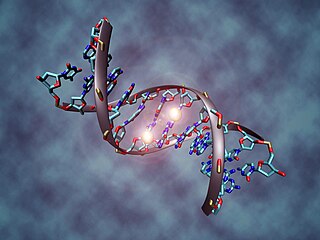Related Research Articles
Sylvia Therese Richardson is a French/British Bayesian statistician and is currently Professor of Biostatistics and Director of the MRC Biostatistics Unit at the University of Cambridge. In 2021 she became the president of the Royal Statistical Society for the 2021–22 year.

Computational epigenetics uses statistical methods and mathematical modelling in epigenetic research. Due to the recent explosion of epigenome datasets, computational methods play an increasing role in all areas of epigenetic research.
Mailman School of Public Health, is the public health graduate school of Columbia University. Located on the Columbia University Medical Center campus in the Washington Heights neighborhood of Manhattan, New York City, the school is recognized by the Council on Education for Public Health.

An epigenome-wide association study (EWAS) is an examination of a genome-wide set of quantifiable epigenetic marks, such as DNA methylation, in different individuals to derive associations between epigenetic variation and a particular identifiable phenotype/trait. When patterns change such as DNA methylation at specific loci, discriminating the phenotypically affected cases from control individuals, this is considered an indication that epigenetic perturbation has taken place that is associated, causally or consequentially, with the phenotype.

Steve Horvath is a German–American aging researcher, geneticist, and biostatistician. He is a professor at the University of California Los Angeles known for developing the Horvath aging clock, which is a highly accurate molecular biomarker of aging, and for developing weighted correlation network analysis. The recipient of several research awards he has studied genomic biomarkers of aging, the aging process, and many age related diseases/conditions.
Mei-Ling Ting Lee is a Taiwanese-American biostatistician known for her research on microarrays. She is a professor of epidemiology and biostatistics at the University of Maryland, College Park, and the founding editor-in-chief of the journal Lifetime Data Analysis. She was president of the International Chinese Statistical Association for 2016.
Donna Jean Brogan is an American statistician and professor emeritus of statistics at Emory University. Brogan has worked in biostatistical research in the areas of women's health, mental health and psychosocial health statistics, statistics on breast cancer, and analysis of complex survey data.
Motomi (Tomi) Mori is a Japanese biostatistician. Formerly the Walter & Clora Brownfield Professor of Cancer Biostatistics at the Knight Cancer Institute of Oregon Health & Science University (OHSU), she was named endowed professor and chair of biostatistics at St. Jude Children's Research Hospital in 2020. She is the chair of the Caucus for Women in Statistics for 2021.
Jean Yee Hwa Yang is an Australian statistician known for her work on variance reduction for microarrays, and for inferring proteins from mass spectrometry data. Yang is a Professor in the School of Mathematics and Statistics at the University of Sydney.
Sharon Xiangwen Xie is a Chinese biostatistician and epidemiologist who studies neurodegenerative diseases. She is a professor of biostatistics in the Department of Biostatistics, Epidemiology, and Informatics at the University of Pennsylvania.
Josée Dupuis is a Canadian biostatistician. She is a professor in the Boston University School of Public Health, where she chairs the department of biostatistics. Her research interests include genome-wide association studies, gene–environment interaction, and applications to diabetes and cardiovascular disease.

Bhramar Mukherjee is an Indian-American biostatistician, data scientist, professor and researcher. She is the John D. Kalbfleisch Collegiate Professor and the Chair of Department of Biostatistics, a professor of epidemiology at the University of Michigan. She serves as the associate director for Quantitative Data Sciences at University of Michigan Rogel Cancer Center. She is the Chair elect for Committee of Presidents of Statistical Societies (COPSS) for a three-year term starting 2019.
Ying Guo is a Chinese biostatistician specializing in biomedical imaging, neuroimaging, and high-dimensional data analysis. She is a professor of biostatistics and bioinformatics at Emory University, where she directs the Emory Center for Biomedical Imaging Statistics.
Brisa N. Sánchez is a Mexican-American biostatistician and environmental epidemiologist, whose research has included work on the spatial analysis of fast food restaurants, on nutrition in schools, on the relation between the characteristics of neighborhoods and the health of their residents, on the water infrastructure in Mexico City, and on latent variable models in environmental statistics. She is the Dornsife Professor of Biostatistics at Drexel University.
Jane Pendergast is an American biostatistician specializing in multivariate statistics and longitudinal data. She is a professor in the Department of Biostatistics & Bioinformatics at Duke University.
Keumhee Carrière Chough is a Korean-Canadian statistician whose theoretical contributions include work on repeated measures design; she is co-editor of Analysis of Mixed Data: Methods & Application, and has also contributed to highly-cited works on public health. She is a professor of mathematical and statistical sciences at the University of Alberta.
Rebecca Allana Hubbard is an American biostatistician whose research interests include observational studies and the use of electronic health record data in public health analysis and decision-making, accounting for the errors in this type of data. She is a professor of biostatistics in the Perelman School of Medicine at the University of Pennsylvania.

Stephanie J. London is an American epidemiologist and physician-scientist specializing in environmental health, respiratory diseases, and genetic susceptibility. She is the deputy chief of the epidemiology branch at the National Institute of Environmental Health Sciences.
Clarice Ring Weinberg is an American biostatistician and epidemiologist who works for the National Institute of Environmental Health Sciences as principal investigator in the Biostatistics and Computational Biology Branch. Her research concerns environmental epidemiology, and its combination with genetics in susceptibility to disease, including running the Sister Study on how environmental and genetic effects can lead to breast cancer. She has also published highly cited research on fertility.
Melanie Marie Wall is an American psychiatric biostatistician, psychometrician, and mental health data scientist who works at Columbia University as a professor in the departments of biostatistics and psychiatry, and as director of Mental Health Data Science, a joint project of the Columbia University Department of Psychiatry, Columbia University Medical Center, Research Foundation for Mental Hygiene, and New York State Psychiatric Institute. Her research has included topics such as grief and depression, eating disorders, marijuana use and abuse, and correlations between school performance and athletic activity, studied using latent variable models, spatial analysis, and longitudinal data. She is co-editor of the book Surviving Vietnam: Psychological Consequences of the War for US Veterans.
References
- 1 2 3 Curriculum vitae (PDF), May 2021, retrieved 2021-07-23
- ↑ "Hongmei Zhang", Faculty profiles, University of Memphis School of Public Health, retrieved 2021-07-23
- ↑ Hongmei Zhang at the Mathematics Genealogy Project
- ↑ Chaturvedi, Anoop, "Review of Analyzing High-Dimensional Gene Expression and DNA Methylation Data with R", Journal of the Royal Statistical Society, Series A, doi:10.1111/rssa.12706, S2CID 236341341
- ↑ Hurd, Deamonte; Hairston, Mia (February 16, 2016), "Dr. Hongmei Zhang receives NIAID grant for asthma study", The Daily Helmsman
- ↑ ASA Fellows list, American Statistical Association, retrieved 2021-07-23
- ↑ "2021 ASA Election Results" (PDF).